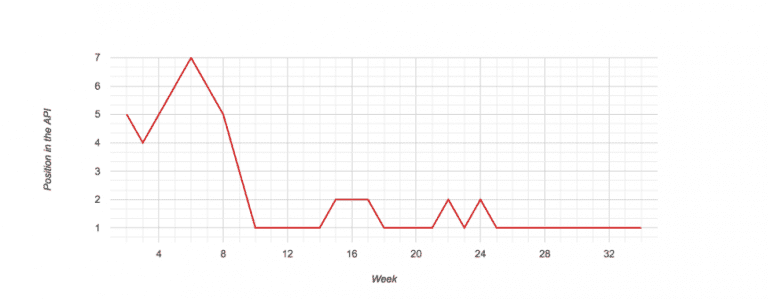Welcome to the Audi Player Index Playoffs Analysis! Throughout the Audi 2016 MLS Cup Playoffs, we will be bridging the gap between on-field dynamics and Audi Player Index metrics. By coupling tactical dynamics with data from the Audi Player Index, these posts will be a means to further analyze individual and team performances from the Knockout Round through MLS Cup on Dec. 10.
We'll get to that on Tuesday. This post is all about Sebastian Giovinco and how he put his stamp on the league en route to becoming the top ranked player in the Audi Player Index over the 2016 regular season. Not only was Giovinco the league's most prolific player (17 goals, 15 assists), his technical ability, creativity, cutting passes and clinical finishing passed the eye test and caused all sorts of problems for opponents.
The Audi Player Index rankings captured the same impression as those watching week after week as well. During the 34 weeks of the MLS regular season, Giovinco led the rankings for the final nine, remained in first for 20 weeks overall, and stayed in the top three for more than two thirds of the year.
Week-to-week Audi Player Index rankings for Giovinco are charted below:

No matter the intricacies that unfold over 90 minutes between 22 players, the flow of a match is dictated by goals. And Giovinco’s style of play demonstrates a deep appreciation for direct, goal-dangerous play. One of the reasons the Toronto FC midfielder had so much success on the field and in the Audi Player Index this season was by leading his team in scoring.
But what truly made this season so special for Giovinco – and what separated him from other top-tier performers such as David Villa, Ignacio Piatti and Bradley Wright-Phillips – is the influence Giovinco exerted over matches even when he didn't find the back of the net.
Despite his goal record, Giovinco failed to score in more than half of the games he played in this year. In those 16 games, the Italian was on average the third-best player on the field per the Opta-powered Audi Player Index scoring system, with a typical score of 789. It's worth noting that without any goals, that figure alone is good enough for third place in the final Audi Player Index rankings. Moreover, in the same 16 games, Giovinco completed an average of 28 passes in the opposition half and almost 11 in the final third.
To give this context, the second-best player in the Audi Player Index rankings from this season was Villa. In the 15 games in which Villa did not score, he was rated as the ninth-best player during the match on average with a typical score of 496.

Now there's little doubt that as a free-ranging playmaker given permission to go where he likes, Giovinco has more tactical freedom than out-and-out forwards such as David Villa. And it would be an easy argument to make that forwards like Villa or Wright-Phillips connect fewer passes because they are on the receiving end of such actions more often. Yet in the same collection of games where neither scored, Giovinco still averaged more shots on target than Villa: 1.75 to 1.3.
Not only did Giovinco provide more for his teammates going forward, but he was also involved in the culmination of more quality chances created by his teammates or himself. Simply put, the reigning Landon Donovan MLS MVP earned the freedom he enjoys.
There is no way to deny the impact that goals have on matches. Goals win games and should be rewarded handsomely by the Audi Player Index. However, consistently finding ways to put pressure on opposition defenses, being a dynamic and threatening attacking player and valuing possession in crucial parts of the field are all fundamentally crucial aspects of the game beyond scoring.
Thanks to all of the above, Giovinco outpaced his competition in the Audi Player Index, a deserving chart-topper if there ever was one.
Sam Polak has written for FourFourTwo and the NSCAA, and became interested in coaching and tactics after an unfortunate knee injury. When not watching soccer, he is very likely tuning in to an NBA game.












